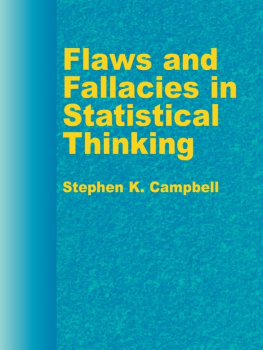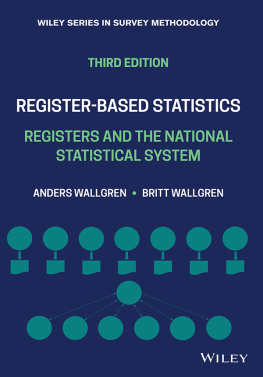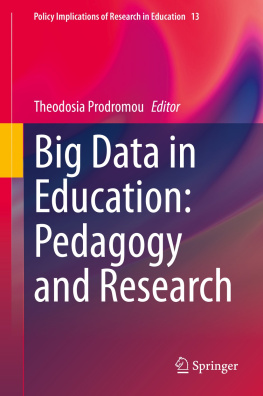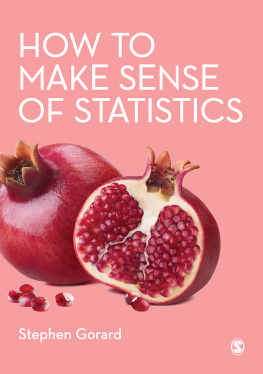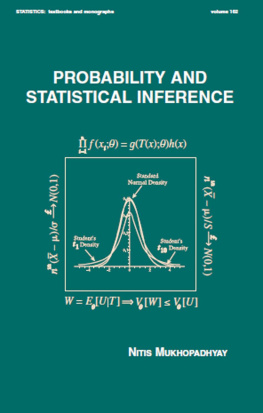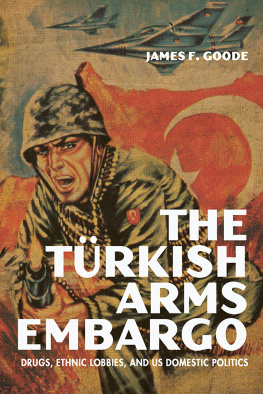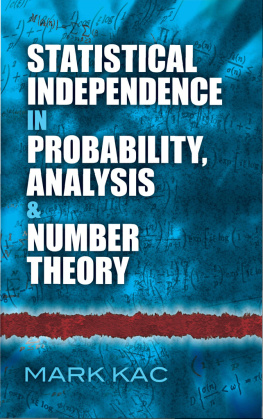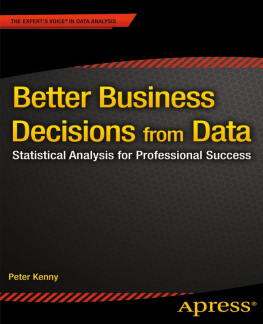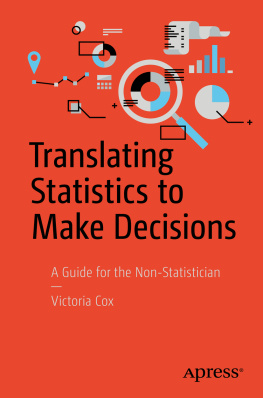Stephen Kent Campbell - Flaws and Fallacies in Statistical Thinking
Here you can read online Stephen Kent Campbell - Flaws and Fallacies in Statistical Thinking full text of the book (entire story) in english for free. Download pdf and epub, get meaning, cover and reviews about this ebook. year: 2012, publisher: Dover Publications, genre: Politics. Description of the work, (preface) as well as reviews are available. Best literature library LitArk.com created for fans of good reading and offers a wide selection of genres:
Romance novel
Science fiction
Adventure
Detective
Science
History
Home and family
Prose
Art
Politics
Computer
Non-fiction
Religion
Business
Children
Humor
Choose a favorite category and find really read worthwhile books. Enjoy immersion in the world of imagination, feel the emotions of the characters or learn something new for yourself, make an fascinating discovery.
- Book:Flaws and Fallacies in Statistical Thinking
- Author:
- Publisher:Dover Publications
- Genre:
- Year:2012
- Rating:4 / 5
- Favourites:Add to favourites
- Your mark:
- 80
- 1
- 2
- 3
- 4
- 5
Flaws and Fallacies in Statistical Thinking: summary, description and annotation
We offer to read an annotation, description, summary or preface (depends on what the author of the book "Flaws and Fallacies in Statistical Thinking" wrote himself). If you haven't found the necessary information about the book — write in the comments, we will try to find it.
Flaws and Fallacies in Statistical Thinking — read online for free the complete book (whole text) full work
Below is the text of the book, divided by pages. System saving the place of the last page read, allows you to conveniently read the book "Flaws and Fallacies in Statistical Thinking" online for free, without having to search again every time where you left off. Put a bookmark, and you can go to the page where you finished reading at any time.
Font size:
Interval:
Bookmark:
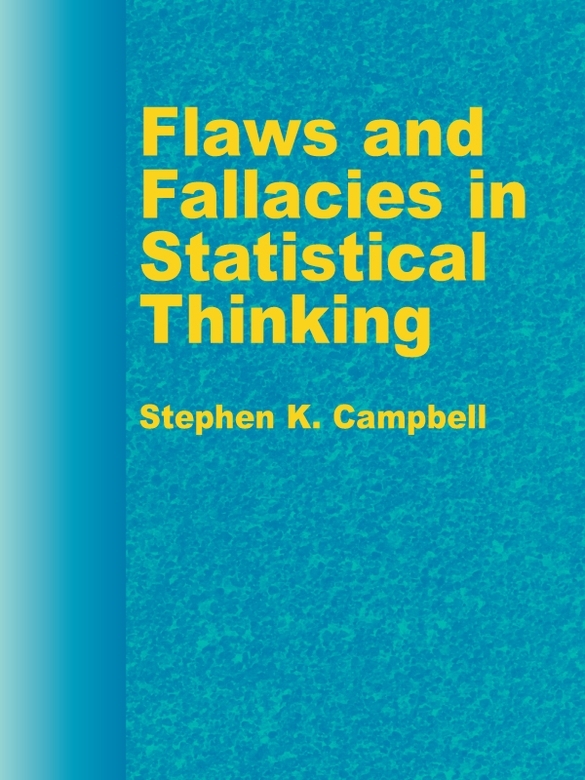
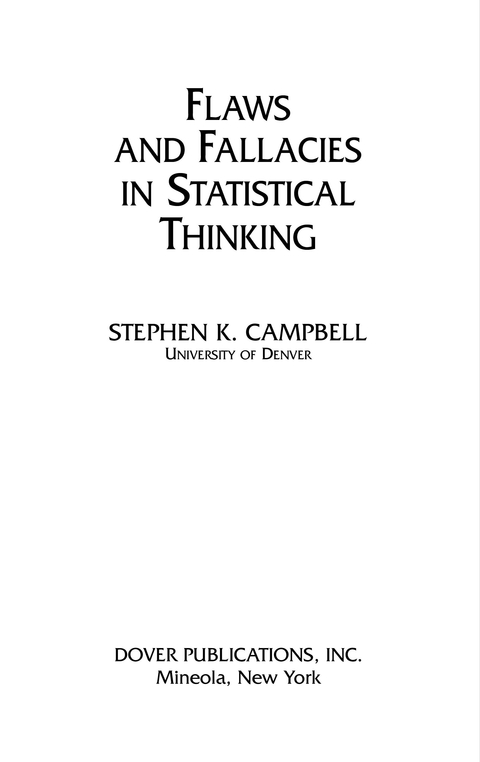
Copyright
Copyright 1974, 2002 by Stephen K. Campbell
All rights reserved.
Bibliographical Note
This Dover edition, first published in 2004, is an unabridged republication of the work originally published by Prentice-Hall, Inc., Englewood Cliffs, New Jersey, in 1974.
Library of Congress Cataloging-in-Publication Data
Campbell, Stephen K. (Stephen Kent)
Flaws and fallacies in statistical thinking / Stephen K. Campbell.
p. cm.
Originally published: Englewood Cliffs, N.J. : Prentice-Hall, 1974.
Includes bibliographical references and index.
9780486140513
1. Statistics. I. Title.
QA276.C272 2004
519.5dc22
2003065966
Manufactured in the United States of America
Dover Publications, Inc., 31 East 2nd Street, Mineola, N.Y 11501
To Judy
When a person loves something he hates to see it abused. Such is my feeling toward statistics. Hardly a day goes by that I fail to see the subject I love put to use in faulty and misleading ways in newspapers, magazines, books, speeches, and, especially, advertising.
Curiously, little of the statistical literature is aimed at helping the nonstatistician recognize such abuses. Statisticians, understandably, tend to write for other statisticians. Still, one of lifes rare truisms is that most people in the world are not statisticians and dont aspire to become statisticians. Nevertheless, it is an ususual person who isnt frequently confronted with the need to evaluate, if only very informally, statistical information when making decisions about a variety of subjects ranging from which political candidate to vote for to which brand of detergent to buy. Professional statisticians dont need help along such lines; keen critical judgment about statistical information is, for most, a natural by-product of their professional training. But who is to help the statistical layman if it is not the statistical professional?
This book was written with two purposes in mindthe first, less important, purpose being that of getting something off my chest. For many years I have been distressed by the frequency with which (1) relatively simple statistical tools such as percents, graphs, and averages are misused and (2) faulty conclusions are drawn from, perhaps, flawless data in our news media simply because the purveyors of the information dont know any better. Moreover, I have been annoyedindeed, made damned madby the frequency with which bogus statistical evidence is used intentionally by some unconscionable people to sell their products or pet ideas to others. Writing this book has been good therapy for me.
The second, more important, purpose of this book is loosely related to the first. I have long felt that the university student who is likely to take only one or two courses in statistics and the ordinary citizen who maybe lacks any classroom exposure whatever to the subject could benefit from a nontechnical book written with a view to helping him increase his ability to judge the quality of statistical evidence and, in turn, to make better-informed decisions about many facets of everyday life. This book, therefore, has been written both as a supplemental reading text for the student taking his first course in statistics and as a self-help guide for the nonstudent who feels the need to evaluate statistical evidence more judiciously than he is presently capable.
The sequence of topics covered is in rough accord with that of many beginning. textbooks in statistics. The terminology used and the manner in which the subjects are treated are based on the assumption that the reader has had little or no prior exposure to the subject of statistics and has studied precious little formal mathematics.
Many people have helped me with the preparation of this bookmore than I can possibly thank individually. I must, however, single out three statistics professors for special thanks. Professors Richard B. Ellis of Northern Essex Community College and Richard E. Lund of Montana State University both reviewed early drafts of the first five chapters and offered many incisive criticisms and imaginative suggestions for improving upon my proposed project. My colleague and friend, Professor Paul R. Merry of the University of Denver, went over the final manuscript with a thoroughness that is so characteristic of everything he does and offered numerous constructive suggestions.
I would also like to thank my statistics students at the University of Denver who gathered hundreds of examples of statistical fallacies from which many of those appearing in the following pages were selected. Also deserving of thanks are several authors, editors, and advertisers who granted me permission to quote from copyrighted material even though they must have suspected that I intended to be more critical than complimentary.
Last, but certainly not least, I wish to thank my wife Judy who not only relinquished without complaint many hours of time with me which were rightfully hers but who also did more than her fair share to create an atmosphere within which the work could proceed with a bare minimum of discord or distraction.
Needless to say, any blame for errors, omissions, or bad manners should be directed at me.
STEPHEN K. CAMPBELL
Statistical thinking will one day be as necessary for efficient citizenship as the ability to read and write.
H. G. WELLS
This book is unusual. Textbooks show you facts and the right methods. This book shows you fallacies and the wrong methods. It will serve as a companion volume to any textbook on statistics. It will also serve as a self- help guide to distinguish between valid and faulty statistical reasoning.
Furthermore, it deals with a very important subject because statistics influence our daily lives in a great many ways. By enlisting the aid of statistics, we measure economic activity; record social progress; elect Presidents and keep abreast of their current popularity (or, more often, unpopularity); measure intelligence, interests, and aptitudes; compare his sexual habits with various norms; determine which television shows will survive and which will not; compare the profit potential of several alternative business strategies; decide whether to invest in bonds or stocks and, if the latter, whether now is a good time to get into the market; keep track of batting averages; assess the likelihood of rain tomorrow; and, in general, keep informed about what is going on in the world with the aid of statistical data gathered, presented, and interpreted by others. Even if you and I have nothing to do with the actual calculations implied by the items in this list (or the many other items that might easily have been included), as socially conscious citizens we should be able to interpret the results of such calculations with some sophistication, for these are the figures that serve as a basis for so many vital newspaper and magazine articles, books, and speeches.
Although something of an exaggeration, the quote from H. G. Wells that introduced this chapter is basically sound. I would amend it only in one important respect and have it read Statistical [straight] thinking will one day be as necessary for efficient citizenship as the ability to read and write. I prefer statistical straight thinking to statistical thinking because it seems unlikely that fuzzy or erroneous thinking could contribute much to efficient citizenshipor efficient anything else, for that matter. Unfortunately, there is enough fuzzy and erroneous statistical thinking around these days to justify my focusing on it in this book.
Font size:
Interval:
Bookmark:
Similar books «Flaws and Fallacies in Statistical Thinking»
Look at similar books to Flaws and Fallacies in Statistical Thinking. We have selected literature similar in name and meaning in the hope of providing readers with more options to find new, interesting, not yet read works.
Discussion, reviews of the book Flaws and Fallacies in Statistical Thinking and just readers' own opinions. Leave your comments, write what you think about the work, its meaning or the main characters. Specify what exactly you liked and what you didn't like, and why you think so.

